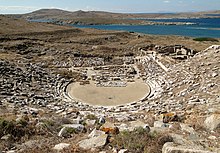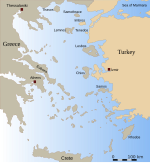Delos
In 1990, UNESCO added Delos to the World Heritage List, citing its exceptional archaeological site which "conveys the image of a great cosmopolitan Mediterranean port", its influence on the development of Greek architecture, and its sacred importance throughout Ancient Greece.The first took place in the sixth century BC, directed by the tyrant Pisistratus, who ordered that all graves within sight of the temple be dug up and the bodies moved to another nearby island.A new decree was eventually issued, so that no one should be allowed to be buried or give birth on the island due to its sacred importance, and to preserve its neutrality in commerce since no one could then claim ownership through inheritance.Suda writes that the Greeks used the proverb "ᾌδεις ὥσπερ εἰς Δῆλον πλέων", meaning you sing as if sailing into Delos in reference to someone who is happy, light-hearted, and enjoying himself.Evidence has been found of Roman baths, coins, an aqueduct, residential and elite houses, multiple churches, basilicas, and a monastery all from the first to sixth centuries AD, which, however, does not suggest that the island was continuously inhabited in the period.Also, a number of wine presses were found amidst the ruins of the ancient city that date to this period, suggesting that the population at this time was engaged in considerable viticultural endeavour.








Delos (disambiguation)RineiaRegionSouth AegeanRegional unitMykonosUNESCO World Heritage SiteSessionAttic GreekDoric GreekGreek islandCycladesarchipelagoGreeceMediterraneanArchaeological Museum of DelosNational Archaeological Museum of AthenssanctuaryGreek mythologyApolloArtemisAthenaPre-GreekMount CynthusUNESCOWorld Heritage ListAncient GreeceMosaics of DelosCarl Anton Joseph RottmannThucydidespiraticalCariansKing MinosOdysseyOrtygiaDionysusdeitiesPanhellenicpilgrimageIonianspurificationsAthensPisistratusPeloponnesian WarDelphic OraclequinquennialAdramyttiumPersian WarsDelian LeaguecongressessanctuariestreasuryPericlesHellenistic periodPhoenician colonytimberexploitedcisternaqueductsanitary drainsagoraeIamblichusEleusinian MysteriesStraboRhodesThird Macedonian WarRoman RepublicAtheniansCilician piratesSeleucid Empireslave marketRoman destruction of CorinthMithridates VIPontusMithridatic WarsPuteoliPausaniasAgora of the Competaliastssacred laketopographicalMinoan FountainmasonryHellenisticpostholesawningsmerchant guildsTemple of the DeliansDoric orderkourosin situBritish MuseumVenetian Arsenalavenues of sphinxesKoinonBerytianhegemonyPoseidonAstarteAphroditeEshmunAsklepiosvenerateSerapisAnubismosaicpantheratriumerotesdolphinsPhoeniciana floor mosaicvestibuleStoivadeionlife-forcephallusDelos SynagogueSamaritansynagoguecensusmunicipalityHouse of Dionysus floor mosaicHouse of the MasksHouse of the LakeHermesMosaic from the Insula of the JewelleryA mosaic on the floor of the House of the Dolphins
